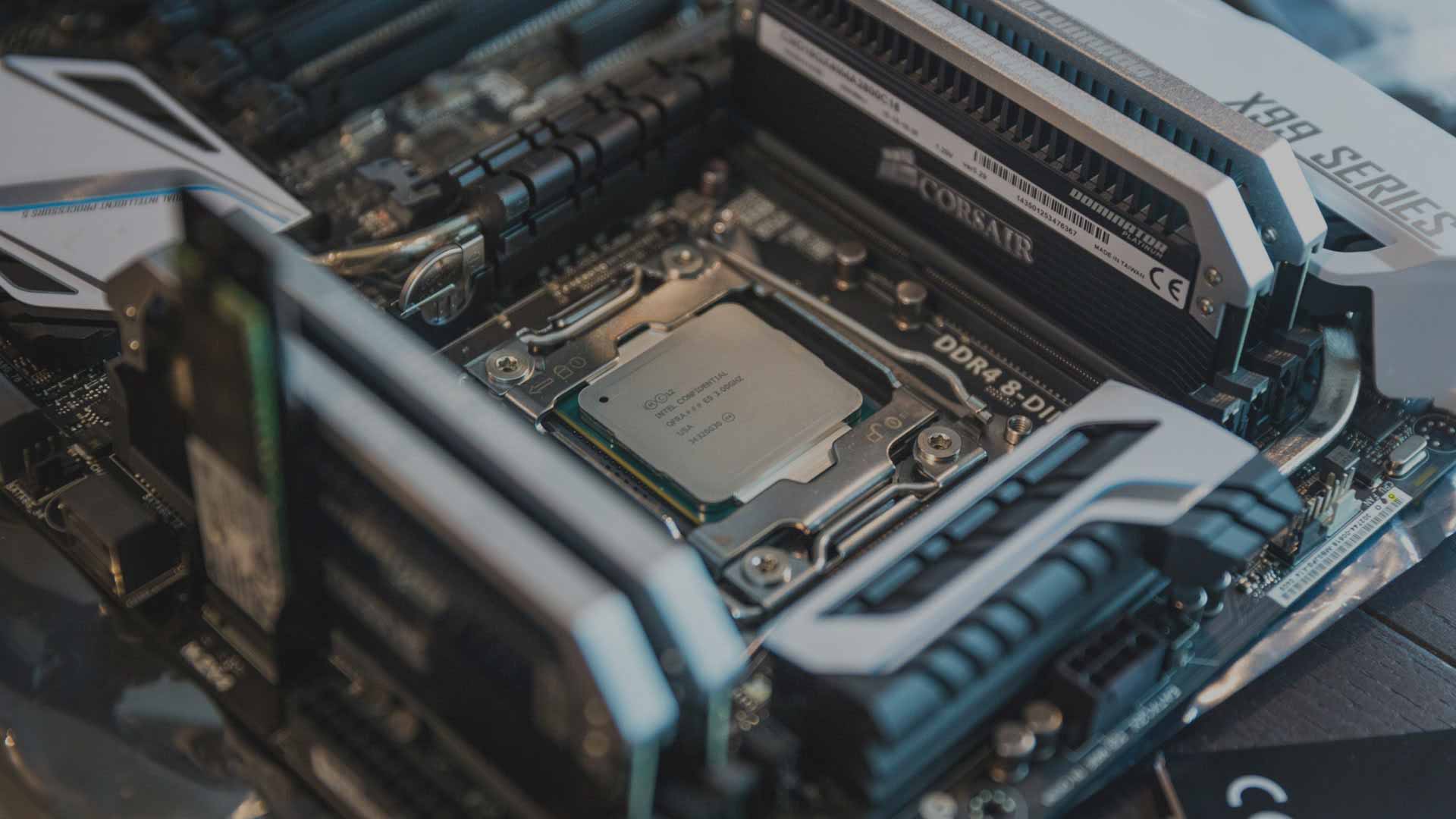
Nvidia RTX 3050 - 6GB vs. Nvidia RTX 4070 Ti SUPER - 16GB
In diesem Vergleich von Nvidia RTX 3050 - 6GB versus Nvidia RTX 4070 Ti SUPER - 16GB vergleichen wir die technischen Daten der beiden GPUs. Welche Grafikkarte ist schneller? Hier gibt es FPS & Benchmarks in Gaming und Anwendungen. Außerdem Daten zu Verbrauch, Effizienz (FPS pro Watt) und Preis-Leistung (FPS pro Euro).
Hinweis: Unsere Links sind Affiliate Links. Wir erhalten beim Kauf eine kleine Provision, ohne dass sich euer Preis erhöht.

Allgemeine Informationen
| Günstigster Preis |
|
|
| Hersteller | ||
| Serie | NVIDIA GeForce RTX 3050 - 6GB | NVIDIA GeForce RTX 4070 Ti SUPER - 16GB |
| Chip-Architektur | Ampere (ab 2020/Q3) | Ada Lovelace (ab 2022/Q3) |
| Chip-Bezeichnung | GA107-325-K2-A1 | AD103-275-A1 |
| Fertigung | Samsung 8 nm | TSMC 5 nm "NVIDIA 4N" |
| Chip-Größe | 200 mm² | 379 mm² |
Spezifikationen
Die Anzahl der Recheneinheiten, die Taktraten sowie die Größe des Cache sind neben der zugrunde liegenden Architektur ein Indiz für die Leistungsfähigkeit eines Produkts. Die Nvidia RTX 3050 - 6GB verfügt über 2304 FP32-ALUs und hat damit deutlich weniger Recheneinheiten als die Nvidia RTX 4070 Ti SUPER - 16GB mit 8448 FP32-ALUs. Der Boost-Takt der Nvidia RTX 3050 - 6GB liegt mit 1470 MHz weniger als/wie bei der Nvidia RTX 4070 Ti SUPER - 16GB mit 2610 MHz.
| Basis-Takt | 1042 GHz | 2340 GHz |
| Boost-Takt | 1470 GHz | 2610 GHz |
| Chip-Konfiguration | 18SM (2304SP / 72TMU / 32ROP) | 66SM (8448SP / 264TMU / 96ROP) |
| Rechenleistung | 6.77 TFLOPS (FP16), 6.77 TFLOPS (FP32), 0.11 TFLOPS (FP64) | 44.1 TFLOPS (FP16), 44.1 TFLOPS (FP32), 0.69 TFLOPS (FP64) |
Kompatibilität und Abmessungen
| Schnittstelle | PCIe 4.0 x16 (x8) | PCIe 4.0 x16 |
Speicher
Die Nvidia RTX 3050 - 6GB verfügt über 6 GB GDDR6 Videospeicher, welcher an ein 96 Bit Speicherinterface angebunden ist und mit 14 Gbps taktet. Die Speicherbandbreite liegt damit bei 168 GB/s. Bei der Nvidia RTX 4070 Ti SUPER - 16GB sind dagegen 16 GB GDDR6X VRAM mit einer Taktrate von 21 Gbps an einem 256 Bit Speicherinterface angeschlossen. Daraus resultiert eine Speicherbandbreite von 672 GB/s.
| Speicherkapazität | 6 GB | 16 GB |
| Speichertyp | GDDR6 | GDDR6X |
| Speicherinterface | 96 Bit | 256 Bit |
| Speichertakt | 14 Gbps (1750 MHz) | 21 Gbps (1313 MHz) |
| Speicherbandbreite | 168 GB/s | 672 GB/s |
Transcoding-Engine
| NVENC | 1x (7th Gen, max. Sessions: 8) | 2x (8th Gen, max. Sessions: 8) |
| NVDEC | 1x (5th Gen) | 1x (5th Gen) |
Encoding
| H.265 | ✓ (4K YUV 4:2:0 / 4K YUV 4:4:4 / 4K Lossless / 8K / HEVC 10bit support / HEVC B Frame support) | ✓ (4K YUV 4:2:0 / 4K YUV 4:4:4 / 4K Lossless / 8K / HEVC 10bit support / HEVC B Frame support) |
| H.264 | ✓ (YUV 4:2:0 / YUV 4:4:4 / Lossless) | ✓ (YUV 4:2:0 / YUV 4:4:4 / Lossless) |
Decoding
| AV1 | ✓ (8bit / 10bit) | ✓ (8bit / 10bit) |
| H.265 | ✓ (8bit 4:2:0 / 10bit 4:2:0 / 12bit 4:2:0 / 8bit 4:4:4 / 10bit 4:4:4 / 12bit 4:4:4) | ✓ (8bit 4:2:0 / 10bit 4:2:0 / 12bit 4:2:0 / 8bit 4:4:4 / 10bit 4:4:4 / 12bit 4:4:4) |
| H.264 | ✓ | ✓ |
| VP9 | ✓ (8bit / 10bit / 12bit) | ✓ (8bit / 10bit / 12bit) |
| VP8 | ✓ | ✓ |
| VP8 | ✓ | ✓ |
| VP8 | ✓ | ✓ |
| VP8 | ✓ | ✓ |
API-Unterstützung
| DirectX | 12 Ultimate (12_2) | 12 Ultimate (12_2) |
| CUDA | 8.6 | 8.9 |
| Vulkan | 1.3 | 1.3 |
| OpenCL | 3.0 | 3.0 |
| OpenGL | 4.6 | 4.6 |
| Shader Modell | 6.7 | 6.7 |
| Multi-GPU-Unterstützung | - | - |
Chip-Unterstützungen
| Raytracing | ✓ (2nd Gen NVIDIA RTX) | ✓ (3rd Gen NVIDIA RTX) |
| NVIDIA Tensor | ✓ (3rd Gen) | ✓ (4th Gen) |
| HDCP | 2.3 | 2.3 |
Sonstiges
| Einführung | 02.02.2024 | 08.01.2024 |
| Herstellergarantie | drei Jahre (ab Produktionsdatum, Abwicklung über Händler) | drei Jahre |
Spiele

- NVIDIA GeForce RTX 3050 - 6GBAVG100.00 %1%100.00 %
- NVIDIA GeForce RTX 4070 Ti SUPER - 16GBAVG421.04 %1%443.45 %

- NVIDIA GeForce RTX 3050 - 6GBAVG15.1 FPS1%7.2 FPS
- NVIDIA GeForce RTX 4070 Ti SUPER - 16GBAVG75.1 FPS1%58.6 FPS

- NVIDIA GeForce RTX 3050 - 6GBAVG46.5 FPS1%24.4 FPS
- NVIDIA GeForce RTX 4070 Ti SUPER - 16GBAVG179.6 FPS1%113.1 FPS

- NVIDIA GeForce RTX 3050 - 6GBAVG170.7 FPS1%79.2 FPS
- NVIDIA GeForce RTX 4070 Ti SUPER - 16GBAVG651.8 FPS1%385.4 FPS

- NVIDIA GeForce RTX 3050 - 6GBAVG28 FPS1%23.3 FPS
- NVIDIA GeForce RTX 4070 Ti SUPER - 16GBAVG110.6 FPS1%90.5 FPS

- NVIDIA GeForce RTX 3050 - 6GBAVG56.1 FPS1%48.5 FPS
- NVIDIA GeForce RTX 4070 Ti SUPER - 16GBAVG240.1 FPS1%204.3 FPS

- NVIDIA GeForce RTX 3050 - 6GBAVG59.6 FPS1%48.3 FPS
- NVIDIA GeForce RTX 4070 Ti SUPER - 16GBAVG207.1 FPS1%146.7 FPS

- NVIDIA GeForce RTX 3050 - 6GBAVG41 FPS1%26.2 FPS
- NVIDIA GeForce RTX 4070 Ti SUPER - 16GBAVG171.6 FPS1%95.3 FPS

- NVIDIA GeForce RTX 3050 - 6GBAVG54.3 FPS1%47.4 FPS
- NVIDIA GeForce RTX 4070 Ti SUPER - 16GBAVG208.4 FPS1%159.9 FPS

- NVIDIA GeForce RTX 3050 - 6GBAVG20 FPS1%13.1 FPS
- NVIDIA GeForce RTX 4070 Ti SUPER - 16GBAVG100.6 FPS1%63 FPS

- NVIDIA GeForce RTX 3050 - 6GBAVG64.4 FPS1%47.2 FPS
- NVIDIA GeForce RTX 4070 Ti SUPER - 16GBAVG282.9 FPS1%193.8 FPS

- NVIDIA GeForce RTX 3050 - 6GBAVG26.7 FPS1%21.7 FPS
- NVIDIA GeForce RTX 4070 Ti SUPER - 16GBAVG112.1 FPS1%88.6 FPS

- NVIDIA GeForce RTX 3050 - 6GBAVG41.4 FPS1%33.4 FPS
- NVIDIA GeForce RTX 4070 Ti SUPER - 16GBAVG187.2 FPS1%148 FPS

- NVIDIA GeForce RTX 3050 - 6GBAVG0.32 FPSNVIDIA GeForce RTX 4070 Ti SUPER - 16GBAVG0.22 FPS

- NVIDIA GeForce RTX 3050 - 6GBAVG0.82 FPSNVIDIA GeForce RTX 4070 Ti SUPER - 16GBAVG0.87 FPS
Spiele (RT)

- NVIDIA GeForce RTX 3050 - 6GBAVG100.00 %1%100.00 %
- NVIDIA GeForce RTX 4070 Ti SUPER - 16GBAVG518.74 %1%578.84 %

- NVIDIA GeForce RTX 3050 - 6GBAVG6.3 FPS1%3.4 FPS
- NVIDIA GeForce RTX 4070 Ti SUPER - 16GBAVG53.6 FPS1%43 FPS

- NVIDIA GeForce RTX 3050 - 6GBAVG13.3 FPS1%8.9 FPS
- NVIDIA GeForce RTX 4070 Ti SUPER - 16GBAVG78.5 FPS1%64.4 FPS

- NVIDIA GeForce RTX 3050 - 6GBAVG30.4 FPS1%25.9 FPS
- NVIDIA GeForce RTX 4070 Ti SUPER - 16GBAVG147.5 FPS1%126.7 FPS

- NVIDIA GeForce RTX 3050 - 6GBAVG46.5 FPS1%34.5 FPS
- NVIDIA GeForce RTX 4070 Ti SUPER - 16GBAVG164.8 FPS1%128.4 FPS

- NVIDIA GeForce RTX 3050 - 6GBAVG21.7 FPS1%15.6 FPS
- NVIDIA GeForce RTX 4070 Ti SUPER - 16GBAVG90.9 FPS1%50.5 FPS

- NVIDIA GeForce RTX 3050 - 6GBAVG22.7 FPS1%18 FPS
- NVIDIA GeForce RTX 4070 Ti SUPER - 16GBAVG102.4 FPS1%89.1 FPS

- NVIDIA GeForce RTX 3050 - 6GBAVG18.8 FPS1%13.1 FPS
- NVIDIA GeForce RTX 4070 Ti SUPER - 16GBAVG97.1 FPS1%63.1 FPS

- NVIDIA GeForce RTX 3050 - 6GBAVG42.5 FPS1%29.5 FPS
- NVIDIA GeForce RTX 4070 Ti SUPER - 16GBAVG205.2 FPS1%141.8 FPS

- NVIDIA GeForce RTX 3050 - 6GBAVG0.15 FPSNVIDIA GeForce RTX 4070 Ti SUPER - 16GBAVG0.12 FPS

- NVIDIA GeForce RTX 3050 - 6GBAVG0.42 FPSNVIDIA GeForce RTX 4070 Ti SUPER - 16GBAVG0.48 FPS
Produktivität

- NVIDIA GeForce RTX 3050 - 6GBAVG100.00 %NVIDIA GeForce RTX 4070 Ti SUPER - 16GBAVG333.68 %

- NVIDIA GeForce RTX 3050 - 6GBPKT38.52 PunkteNVIDIA GeForce RTX 4070 Ti SUPER - 16GBPKT151.37 Punkte

- NVIDIA GeForce RTX 3050 - 6GBPKT147.9 PunkteNVIDIA GeForce RTX 4070 Ti SUPER - 16GBPKT170.8 Punkte

- NVIDIA GeForce RTX 3050 - 6GBPKT21.5 PunkteNVIDIA GeForce RTX 4070 Ti SUPER - 16GBPKT80 Punkte

- NVIDIA GeForce RTX 3050 - 6GBPKT18.35 PunkteNVIDIA GeForce RTX 4070 Ti SUPER - 16GBPKT63.68 Punkte

- NVIDIA GeForce RTX 3050 - 6GBPKT50.52 PunkteNVIDIA GeForce RTX 4070 Ti SUPER - 16GBPKT129.03 Punkte

- NVIDIA GeForce RTX 3050 - 6GBPKT39 PunkteNVIDIA GeForce RTX 4070 Ti SUPER - 16GBPKT140 Punkte

- NVIDIA GeForce RTX 3050 - 6GBPKT97.33 PunkteNVIDIA GeForce RTX 4070 Ti SUPER - 16GBPKT403.6 Punkte

- NVIDIA GeForce RTX 3050 - 6GBPKT49.93 PunkteNVIDIA GeForce RTX 4070 Ti SUPER - 16GBPKT206.11 Punkte

- NVIDIA GeForce RTX 3050 - 6GBAVG0.35 FPSNVIDIA GeForce RTX 4070 Ti SUPER - 16GBAVG0.18 FPS

